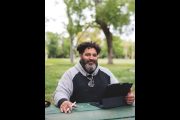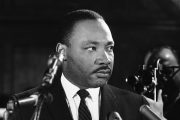
Following 90 minutes of oral arguments in Shurtleff v. City of Boston on Tuesday, it appeared that the City of Boston lost.
For years Boston has turned one of three flagpoles in front of City Hall into a public forum, allowing flags from many nations and assorted groups to be flown from it. In fact, over the past 12 years the city has granted every one of the 284 requests it has received.
Until 2017. Harold Shurtleff, co-founder of Camp Constitution and former field coordinator for the John Birch Society, asked the city for permission to fly the Christian flag for one hour on September 17 to honor Constitution Day and Citizenship Day. The flag raising was to be accompanied by presentations by local preachers on Boston’s Christian history. The city denied his request.
Shurtleff, with the assistance of Liberty Counsel, a non-profit law firm, filed suit. Lower courts ruled against Shurtleff, claiming that the city had the right to deny permission because the word “Christian” implied endorsement by the city.
The city’s attorney, Doug Hallward-Driemeier, said that “the city, for its own speech, does not want to get into the issue of religion.… It didn’t want to fly a flag that was offered as ‘the Christian flag’ because that wasn’t the message that the city itself wanted to communicate.”
Attorneys for Shurtleff, on the other hand, said that Boston treated the flagpole as a public forum, allowing flags from communist China and communist Cuba, a “gay pride” flag, a “transgender” flag, and even the Turkish flag, which depicts the Islamic star and crescent, to be flown from the flagpole.
Liberal Supreme Court Justice Elena Kagan agreed with Liberty First president Mat Staver, saying that banning a religious group from conveying its message in a “transient” (i.e., public) setting open to a variety of speakers and groups violates the First Amendment’s guarantee of freedom of speech.
Hallward-Driemeier admitted that, if the court does in fact rule that the flagpole represents a public forum, then the city has no defense.
Kagan quizzed Staver, asking, “Does the city have to say yes to a Swastika?” He responded affirmatively: “If the city allows a Black Lives Matter flag, then it will probably have to allow a Proud Boys flag. That’s just what the First Amendment requires.”
When Hallward-Driemeier claimed that the city’s “goal is to foster diversity of communities” and “commemorate events or occasions,” Justice Clarence Thomas jumped on it, saying that if Christians are not part of that “diversity” that Boston claims to support, “that’s limited diversity.” Justice Amy Coney Barrett asked rhetorically, “Isn’t celebrating Constitution Day considered an event?”
Even the ACLU came down on Shurtleff’s side. Said David Cole, ACLU’s national director, “When the government opens its public property for private speakers, it has to treat everybody equally. This case is really about private citizens’ access to government property to express themselves. And that access is critical to our ability to speak to each other, to express our views.”
Liberty Counsel’s Staver said afterwards:
This case is so much more significant than a flag.
Boston cheated when it opened its flagpole to all applicants and then excluded Christian viewpoints. The city then claimed that the flagpole never [was] a public forum despite its history and express policy.
The city’s censorship is clearly unconstitutional, and government cannot censor religious viewpoints.
That is how the Supreme Court is likely to rule when it announces its decision in June.



